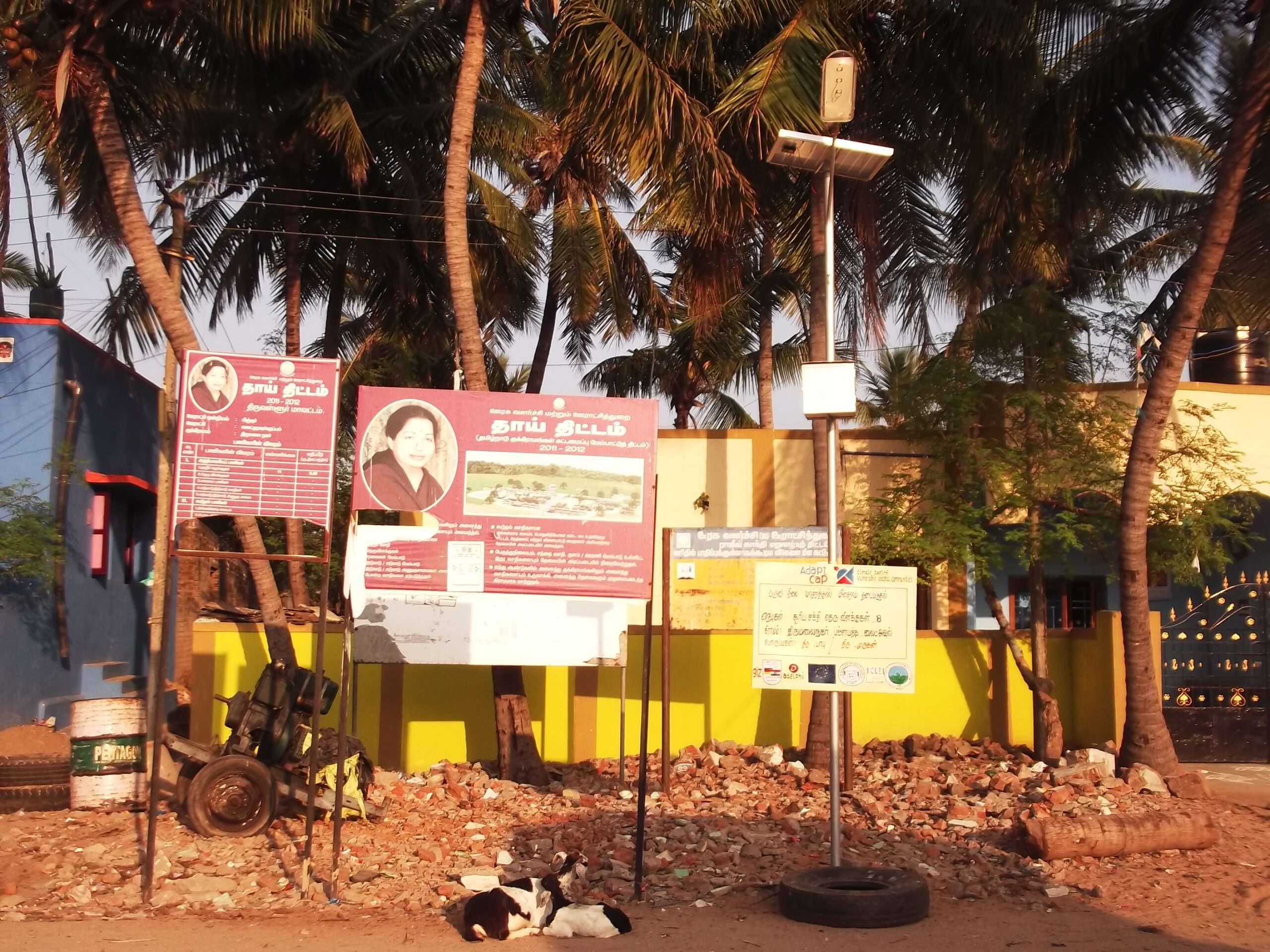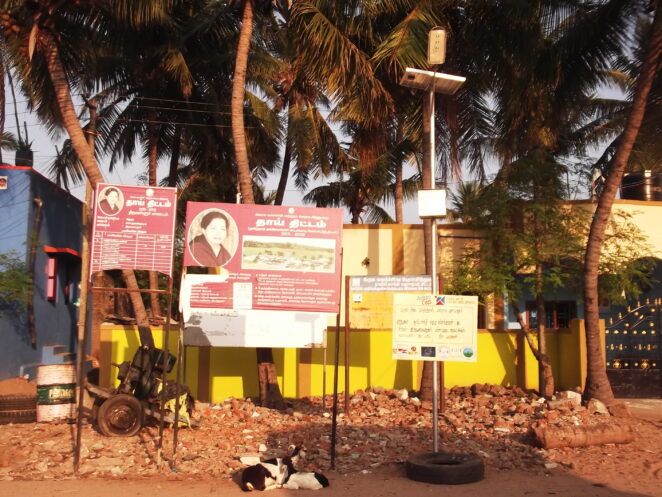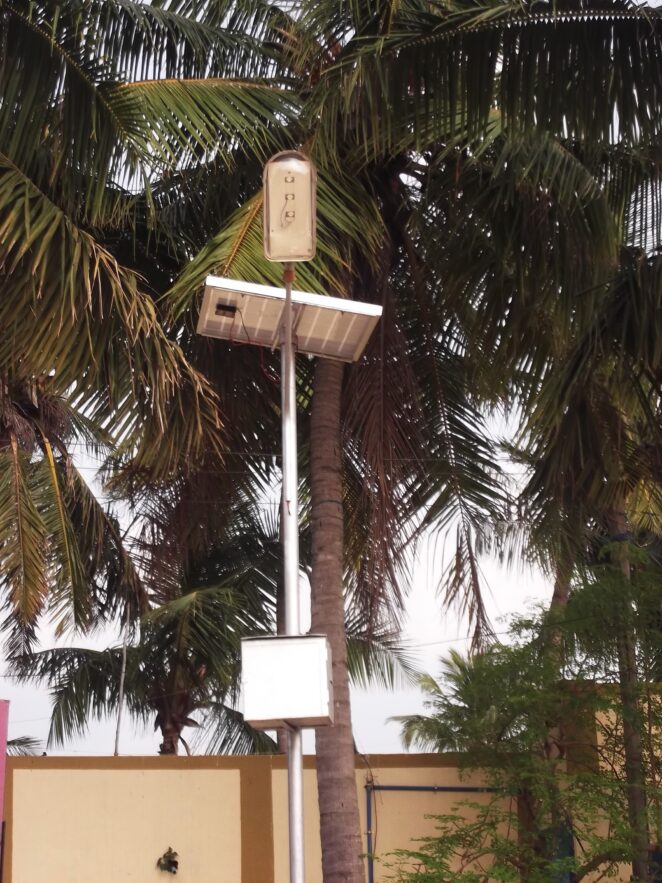Climate-smart street lighting – Lighting up public and work life in the village of Thirumalai Nagar, India


Thirumalai Nagar’s climate smart street lighting
350 families live in the village of Thirumalai Nagar, which is located only 500m from the sea in Tamil Nadu. It was reconstructed after being wiped out by the tsunami in 2004. Fishing is the villagers’ only source of income and night fishing is particularly common as villagers need to follow the changing patterns of catch. The community was dependent on an unreliable power grid with frequent power outages particularly during storms and monsoon season. Climate change is projected to increase the number and intensity of extreme weather events, putting additional pressure on the unstable energy supply. The existing lighting in form of fluorescent bulbs hanging from electric wires was generally poor, jeopardizing public and work life and posing a threat to peoples’, especially women’s, safety.
Supported by the EU-financed “AdaptCap” project, the community in Thirumalai Nagar decided to address these issues by installing eight solar lamp posts. They were erected in areas critical to village life, such as the fishing equipment storage area, the village water desalination plant, public bathrooms, at the school and temple courtyard. The lights turn on automatically from 6 pm to 6 am and can run for 18-20 hours without sunshine, greatly reducing greenhouse emissions. Thanks to the new street lights children are able to study at night and community members are able to do their routine work without depending on electrical energy. People are protected from frequent power cuts due to low voltage. The measure also addresses the safety issues by installing lights in public areas and near the communities’ latrines.
The community’s response to the adaptation measures has been very positive. The president of the village’s Panchayat expressed that the design and their easy, yet reliable operation are very useful. As the places where the light posts were installed were chosen by the community, the lighting has made public and work life far better. The community members, particularly the women, also maintain that it makes moving around the village at nighttime possible and safer. Key benefits of the project in Thirumalai Nagar are:
- Saving energy (costs): One solar light generates 30 KWh/h and up to 360 KWh/d. In total 8 solar lights generate 2,880 KWh, saving 1,401 KWh electricity per year.
- Ensure lighting and light posts withstand extreme weather events: Posts are 10 feet high and battery boxes for LED lighting are installed at the top of the light pole, ensuring that these are not affected, for example, by flooding.
Implementation Costs
The overall costs of this adaptation measure – including a local vulnerability and needs assessment, capacity building measures in the community, technical support as well as material and labour costs – amounted to Rs. 262,000 of which Rs. 212,000 were borne by AdaptCap while the community incurred expenses of Rs. 50,000.
Operation & maintenance of the system
In order to remain operative in the long run, several parts of the system require regular operation and maintenance (O&M). Regular O&M activities include:
- Ensuring both light posts and lighting are intact and function well
- Cleaning of solar panels of each light post
- Ensuring the battery of each light post is working
- Replacing bulbs and other parts of light post if required
The community has distributed the responsibilities and time frames for O&M activities among their members, with two youth members of the Village Development Committee being responsible for cleaning solar panels and making sure lighting works. Practically all regular maintenance activities are implemented by the community itself. The Panchayat steps in if parts need to be replaced and batteries checked. The average monthly O&M costs amount to Rs. 2,500. The Panchayat raises the money necessary to sustain O&M costs from the local general fund, which is also used to finance festivals, general meetings and other village activities.
M&E of activities and benefits
A monitoring and evaluation (M&E) system was developed to regularly screen and assess the adaptation measure’s sustainability and impact. Information is collected in four areas:
- Effectively achieved vulnerability reduction
- Acceptance by and technical feasibility for the community
- Cost for implementation and regular O&M
- Positive and negative side effects (i.e., environmental, social, economic)
Challenges and lessons learnt
- Community participation should be ensured throughout all phases of such an initiative, making it more efficient and sustainable.
- As solar lighting programmes are often new to rural communities in India, the time schedule should leave enough time to consider potential technical or organizational problems.
- Installation costs can be reduced by installing solar lights on already existing light posts. This, however, requires approval by respective authorities, potentially prolonging the process.

Solar driven street light
Project background and partners
The project “AdaptCap – Strengthening Adaptation Capacities and Minimizing Risks of Vulnerable Coastal Communities in India” financed by the European Commission has set out to strengthen the adaptation capacities of vulnerable coastal communities in Andhra Pradesh and Tamil Nadu (India) and minimize their climate change-related risks using an integrated approach.
The three-year initiative is implemented by the Indo-German Environment Partnership Programme of Deutsche Gesellschaft für Internationale Zusammenarbeit (GIZ-IGEP) in partnership with four Indian and international partners.
GIZ-IGEP is responsible for the overall implementation and project management.
AVVAI Village Welfare Society (AVVAI) supports the stakeholders in three cities and nine villages in Tamil Nadu as a local partner, providing training and implementation support in assessing adaptation needs and developing and carrying out adaptation measures.
Academy of Gandhian Studies (AGS) fulfills the same role in Andhra Pradesh.
adelphi contributed to developing technology solutions for the pilot projects and M&E frameworks, designing and implementing capacity building programmes and providing technical support for pilot project implementation.
ICLEI South Asia led the implementation of activities in the six urban areas targeted by AdaptCap.
(0) Comments
There is no content